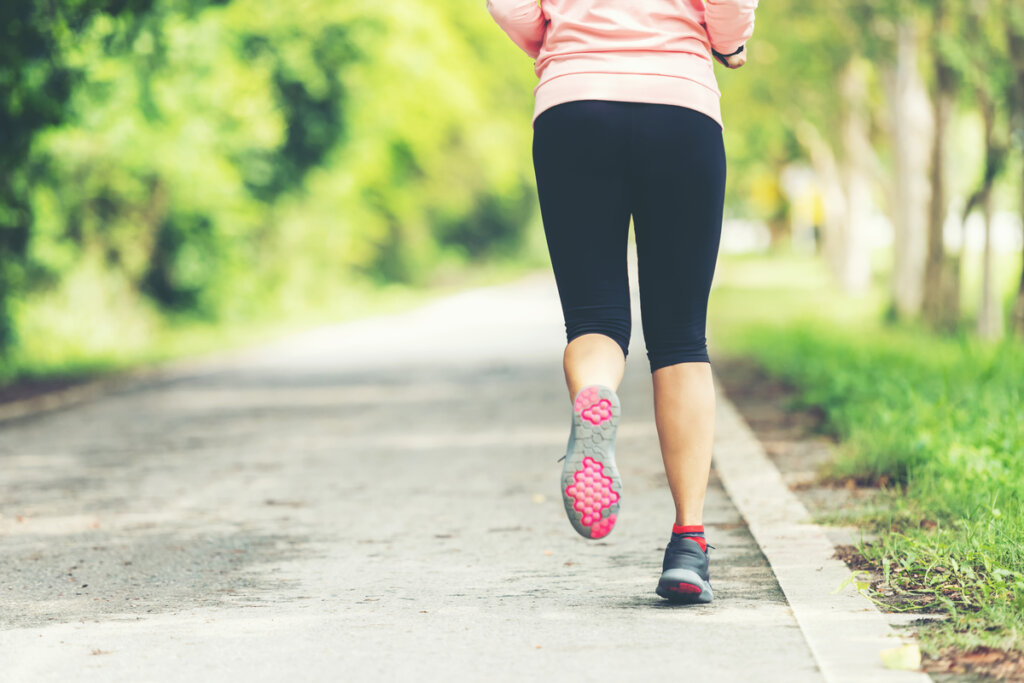Feeling Uncomfortable When You Get Out of Bed in the Morning


Reviewed and approved by the doctor Leonardo Biolatto
The purpose of sleep is to allow our bodies to rest and recover. However, some people wake up feeling just as tired as when they went to bed or suffer from pain and inflammation. So, if you’ve ever wondered why you feel uncomfortable when you get out of bed in the morning, you need to know that it could suggest an underlying problem. After all, resting should make you feel energized.
There’s no one simple answer to this problem. In fact, it could be due to many causes. That’s because we’re all different. So, for personalized guidelines, you first need to understand a little more about the possible causes of your bad sleeping patterns.
Feeling uncomfortable when you get out of bed in the morning
As a rule, you retire to bed when your energy levels are low and your body needs to replenish itself. Generally, after a good night’s sleep, you wake up with the feeling that your body has recovered. But there are several situations that can affect your quality of rest and prevent your sleep from being restful.
If you find yourself feeling uncomfortable as soon as you wake up in the morning and find it difficult to get out of bed, you might also experience the following symptoms:
- Pain in your muscles and joints.
- Stiffness.
- Fatigue.
As we mentioned earlier, there’s more than one reason that might explain why you feel uncomfortable when you get out of bed in the morning. If you want to alleviate the problem, you must start by identifying its causes. Then, you can start to think about the necessary interventions.
Next, we’ll explore the most common factors for feeling uncomfortable when you get out of bed in the morning.

Mattress and pillows in poor condition
It may seem obvious, but the first thing you should check is the quality of your bed and bedding materials. Some people claim they rest better in firm beds while others prefer soft ones. Scientific evidence indicates that comfort is measured subjectively.
For example, Bader and Engdal (2000) published a study on the influence of mattress firmness on sleep. They enlisted nine men to sleep on mattresses of different firmness for several days. The results showed that four of them slept better on soft mattresses, while two preferred hard ones.
So, if you’re feeling uncomfortable when you get out of bed in the morning, check the comfort level of your mattress. If it’s worn, it may be spoiling your night’s rest.
Poor sleep hygiene
Sleep hygiene involves a group of habits that directly affect the quality of your rest. If you don’t take them into account, you may end up sleeping badly. For example:
- Eating foods that are difficult to digest before bed.
- Consuming caffeine a few hours before bed.
- Performing physical exercise a few hours before bed.
- Sleeping in a bedroom that’s too light.
- Being in an overly hot or cold environment.
- Using electronic devices in bed.
The above-mentioned factors can ruin your night’s sleep and make you feel uncomfortable and fatigued. If this is happening to you, it’s a good idea to review your sleeping habits and correct any negative habits. Then, you’ll be able to sleep better. Moreover, you’ll feel good when you wake up.
Illnesses and injuries
Various clinical disorders can cause discomfort that affects your sleep. For instance, arthritis, sleep apnea, chronic pain, and spinal deviations. Psychological conditions such as insomnia, acute stress, depression, and anxiety could also be contributory factors.
For this reason, if you feel uncomfortable when you get out of bed in the morning, you should have a medical check-up. It’ll help you detect any health condition that could be interfering with your rest. Once you receive the treatment you require, the symptoms will most likely disappear.
Sedentary lifestyle or excessive physical activity
Leading a sedentary lifestyle can cause sleep problems. Therefore, regular exercise is recommended. Banno et al. (2018) published a systematic review of the effects of physical activity on sleep. They found that exercise can significantly improve sleep quality.
However, you must be careful not to indulge in excessive physical activity. Indeed, exercising too much or too hard can raise your stress levels. In addition, it increases the risk of causing injuries that generate pain and inflammation. This can also be an obstacle to rest.

Aging
As we age, it’s normal for our bodies to become inflamed. This can cause discomfort when sleeping. It’s due to an elevation in C-reactive protein levels, a key molecule in inflammatory responses. To find out if this is the case, tests must be performed that measure the levels of said protein. So, if you’re feeling uncomfortable when you get out of bed in the morning due to aging, you must ensure you take care of your health.
In conclusion, feeling uncomfortable when you get out of bed in the morning might signify various health conditions. Therefore, if you’re experiencing this problem, make sure you review both your health and your sleeping habits and that your sleep environment is suitable.
The purpose of sleep is to allow our bodies to rest and recover. However, some people wake up feeling just as tired as when they went to bed or suffer from pain and inflammation. So, if you’ve ever wondered why you feel uncomfortable when you get out of bed in the morning, you need to know that it could suggest an underlying problem. After all, resting should make you feel energized.
There’s no one simple answer to this problem. In fact, it could be due to many causes. That’s because we’re all different. So, for personalized guidelines, you first need to understand a little more about the possible causes of your bad sleeping patterns.
Feeling uncomfortable when you get out of bed in the morning
As a rule, you retire to bed when your energy levels are low and your body needs to replenish itself. Generally, after a good night’s sleep, you wake up with the feeling that your body has recovered. But there are several situations that can affect your quality of rest and prevent your sleep from being restful.
If you find yourself feeling uncomfortable as soon as you wake up in the morning and find it difficult to get out of bed, you might also experience the following symptoms:
- Pain in your muscles and joints.
- Stiffness.
- Fatigue.
As we mentioned earlier, there’s more than one reason that might explain why you feel uncomfortable when you get out of bed in the morning. If you want to alleviate the problem, you must start by identifying its causes. Then, you can start to think about the necessary interventions.
Next, we’ll explore the most common factors for feeling uncomfortable when you get out of bed in the morning.

Mattress and pillows in poor condition
It may seem obvious, but the first thing you should check is the quality of your bed and bedding materials. Some people claim they rest better in firm beds while others prefer soft ones. Scientific evidence indicates that comfort is measured subjectively.
For example, Bader and Engdal (2000) published a study on the influence of mattress firmness on sleep. They enlisted nine men to sleep on mattresses of different firmness for several days. The results showed that four of them slept better on soft mattresses, while two preferred hard ones.
So, if you’re feeling uncomfortable when you get out of bed in the morning, check the comfort level of your mattress. If it’s worn, it may be spoiling your night’s rest.
Poor sleep hygiene
Sleep hygiene involves a group of habits that directly affect the quality of your rest. If you don’t take them into account, you may end up sleeping badly. For example:
- Eating foods that are difficult to digest before bed.
- Consuming caffeine a few hours before bed.
- Performing physical exercise a few hours before bed.
- Sleeping in a bedroom that’s too light.
- Being in an overly hot or cold environment.
- Using electronic devices in bed.
The above-mentioned factors can ruin your night’s sleep and make you feel uncomfortable and fatigued. If this is happening to you, it’s a good idea to review your sleeping habits and correct any negative habits. Then, you’ll be able to sleep better. Moreover, you’ll feel good when you wake up.
Illnesses and injuries
Various clinical disorders can cause discomfort that affects your sleep. For instance, arthritis, sleep apnea, chronic pain, and spinal deviations. Psychological conditions such as insomnia, acute stress, depression, and anxiety could also be contributory factors.
For this reason, if you feel uncomfortable when you get out of bed in the morning, you should have a medical check-up. It’ll help you detect any health condition that could be interfering with your rest. Once you receive the treatment you require, the symptoms will most likely disappear.
Sedentary lifestyle or excessive physical activity
Leading a sedentary lifestyle can cause sleep problems. Therefore, regular exercise is recommended. Banno et al. (2018) published a systematic review of the effects of physical activity on sleep. They found that exercise can significantly improve sleep quality.
However, you must be careful not to indulge in excessive physical activity. Indeed, exercising too much or too hard can raise your stress levels. In addition, it increases the risk of causing injuries that generate pain and inflammation. This can also be an obstacle to rest.

Aging
As we age, it’s normal for our bodies to become inflamed. This can cause discomfort when sleeping. It’s due to an elevation in C-reactive protein levels, a key molecule in inflammatory responses. To find out if this is the case, tests must be performed that measure the levels of said protein. So, if you’re feeling uncomfortable when you get out of bed in the morning due to aging, you must ensure you take care of your health.
In conclusion, feeling uncomfortable when you get out of bed in the morning might signify various health conditions. Therefore, if you’re experiencing this problem, make sure you review both your health and your sleeping habits and that your sleep environment is suitable.
All cited sources were thoroughly reviewed by our team to ensure their quality, reliability, currency, and validity. The bibliography of this article was considered reliable and of academic or scientific accuracy.
- Bader, G. G., & Engdal, S. (2000). The influence of bed firmness on sleep quality. Applied ergonomics, 31(5), 487-497. Recuperado de: https://www.sciencedirect.com/science/article/pii/S0003687000000132
- Banno, M., Harada, Y., Taniguchi, M., Tobita, R., Tsujimoto, H., Tsujimoto, Y., & Noda, A. (2018). Exercise can improve sleep quality: a systematic review and meta-analysis. PeerJ, 6, e5172. Recuperado de: https://peerj.com/articles/5172/?td=wk
- Carrillo, P., Barajas, K. G., Sánchez, I., & Rangel, M. F. (2018). Trastornos del sueño: ¿qué son y cuáles son sus consecuencias? Revista de la Facultad de Medicina (México), 61(1), 6-20. Recuperado de: https://www.scielo.org.mx/scielo.php?pid=s0026-17422018000100006&script=sci_arttext
- Patel, D., Steinberg, J., & Patel, P. (2018). Insomnia in the elderly: a review. Journal of Clinical Sleep Medicine, 14(6), 1017-1024. Recuperado de: https://jcsm.aasm.org/doi/abs/10.5664/jcsm.7172
- Ohayon, M., Chen, M., Bixler, E., Dauvilliers, Y., Gozal, D., et al. (2018). A provisional tool for the measurement of sleep satisfaction. Sleep Health, 4(1):6-12. Recuperado de: https://www.sciencedirect.com/science/article/abs/pii/S2352721817302280#preview-section-abstract
This text is provided for informational purposes only and does not replace consultation with a professional. If in doubt, consult your specialist.







